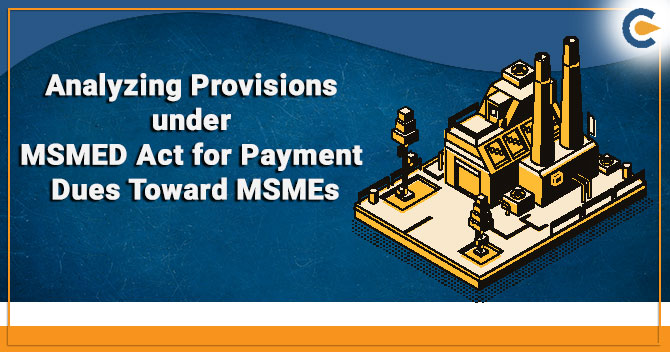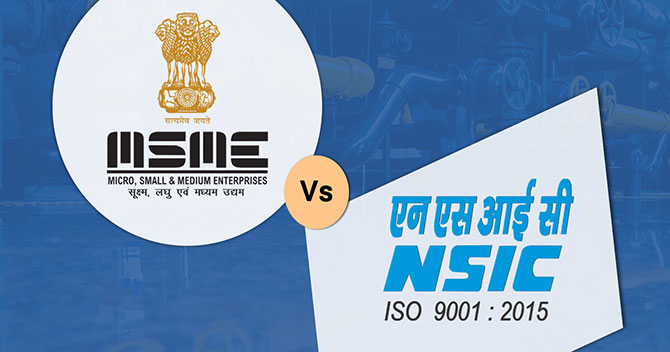The MSMED Act, 2006 was introduced on 16th June 2006 by the Indian government via notification in the official Gazette. The MSMED Act (aka Micro, Small, and Medium Enterprises Development) underpins the norms for the deferred payments to MSME by providing a maximum credit timeline & higher penal interest in prolonging delay.
The companies will be held answerable for causing unnecessary payment delay. They are required to mention the reason for the same in the statement of accounts. Before we start to unwrap the MSME & differed payment concept, let us explore the prevailing norms for Non-Disclosure of dues payable to MSMEs.
What is the MSME Classification?
As per the Section 7 of the MSMED Act, the industries involved with the production of goods or providing services must be classified as mentioned in the table below:-
The classification of Composite criteria is mentioned below-
| Classification | Micro | Small | Medium |
| Manufacturing & Service | 1. Investment Less Than Rs. 1 Cr. And 2. Turnover Less Than Rs. 5 Cr. | 1. Investment Less Than Rs. 10 Cr. And 2. Turnover Less Than Rs. 50 Cr. | 1. Investment Lessthan Rs. 50 Cr. And 2. Turnover Less Than Rs. 250 Cr. |
The investment in plant & machinery should adhere to the original cost, excluding the cost of land &items mentioned by the Ministry of Small Scale Industries.
Read our article:Key Measurers Enlisted in the Union Budget 2021 for MSME Sector
Take the following documents into account while determining the enterprise’s classification:
- Copy of invoice related to the purchase of plant & machinery,
- Gross block related to investment as reflected in the audited books
- Certificate issued by certified Charted Accountant vis-à-vis purchase of plant & machinery.
Lastly, the Ministry has to provide clarification that the investment is for the enterprise’s classification. The purchase value will play a vital role in this regard.
What are the Provisions Regarding the Deferred Payments?
The given norms revolve around the delayed payment cites in the MSMED Act:-
Section 15: Buyer’s Liability to Make Payment
The buyer is accountable for making payment on the agreed date. The payment terms should not surpass 45 days from the acceptance’s date regardless of whether the same terms are agreed in writing or not.
Section 16: Date & rate related to the Interest
Suppose the buyers do not make the payment, as cited in Section 15, within the prescribed date. In that scenario, the buyer will be held accountable for paying compound interest along with monthly rests on the amount due on the appointed day or agreed on a date, at three times the bank related provided by the Reserve Bank.
Section 17: Recovery for the Due Amount
The buyer should make payment along with interest for the services provided and goods supplied.
Section 18 (1): Reference to Micro & Small Enterprises Facilitation Council
The state government driven MSEFC (Micro and Small Enterprises Facilitation Council) is established to consider and settle disputable cases regarding delayed payment. Thus, parties involved with the dispute may approach this council for proper reconciliation of the case.
Apart from the erstwhile provisions cites under the MSMED Act, 2006, the Indian government has introduced a web-based portal, viz MSME Samadhaan to deal with a disputable matter regarding delayed payment. It helps individual to file an application under MSMED Act with ease.
The MSMEs with a valid UAM, i.e. UdhyogAadhaar Memorandum, can file an online application via the above system. After dropping the complaint on the portal, the concerned official will scrutinize the same for authenticity and issue directions accordingly to the defaulter, i.e. buyer.
Underlining Disclosure Prerequisites in the Account’s Annual Statement
The buyers, who provided services & purchased goods from the MSMEs, must scrutinize their annual account by a concerned professional as per Section 22 of the MSMED Act, 2006.
The disclosure of the following particulars is mandatory for the buyers in the account’s annual statement concerning MSMEs.
- The unpaid amount as well as the interest due to the supplier till the appointed date;
- The interest addressed by the buyer owing to delayed payments;
- The principal amount & the interest due post appointed date for the delay period;
- The interest amount cumulated and is payable to suppliers at the end of each year;
- The leftover dues and the interest payable in the subsequent years until the interest is paid to the suppliers, i.e. MSMEs.
The Ministry of MSME is vested with rights that allow it to issue direction to all entities who:
- Receives supplies of goods & services from entity registered as MSME and;
- who has caused payment delay and surpassed 45 days from the acceptance’s date or deemed acceptance;
- file half-yearly returns with the Ministry of Corporate Affairs[1] stating the amount & the reason for the delay.
Section 405 of the Companies Act specifies that some companies need to provide the MCA requirements, as cited earlier.
Conclusion
The MSMED Act, 2006 obligates the buyers to make the amount and interest due to the supplier within the stipulated timeframe as cited in the Act. Prolong delay in this context will accrue interest on the buyers in accordance with Act. The buyer must adhere to transparency in terms of financial transaction. As per Section 22 of the Act, the buyer must disclose the delayed payable to MSMEs in their financial statement.
Let us know what you think about of the current predicament faced by the MSMEs in the Covid 29 era. Any insight or info coming from our readers would be appreciated. Use the comment box located below to drop your concerns or thought.
Read our article:MSME Udyam Registration Portal: Everything you Need to Know













